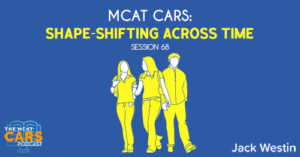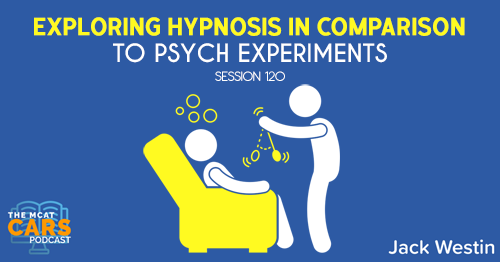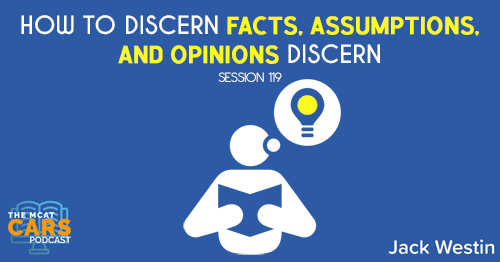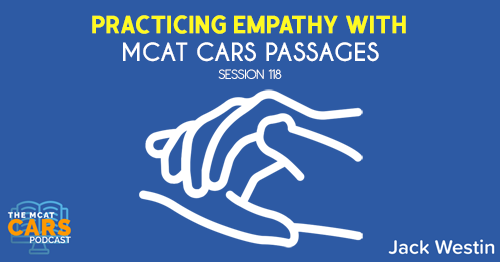Apple Podcasts | Google Podcasts

Session 68
In today’s MCAT CARS passage, we’re looking at history as the interrelation of self-consciousness and society.
Is history dead or is it a window to the future?
Joining us today as always is Jack Westin, the premiere online CARS tutor. And if you haven’t yet, check out all our other podcasts on Meded Media.
Listen to this podcast episode with the player above, or keep reading for the highlights and takeaway points.
Link to article:
https://aeon.co/essays/what-is-history-nobody-gave-a-deeper-answer-than-hegel
History, or at least the study of it, is in bad shape these days. Almost everyone agrees that knowing history is important, but in the United States, except at the most elite schools, the study of history is in freefall. Our age seems to share the skepticism voiced by the German philosopher G W F Hegel (1770-1831) when he said that the only lesson history teaches us is that nobody ever learned anything from history. Why? The present is always new and the future is untested, leading many to sympathise with the American businessman Henry Ford’s pronouncement in 1921 that history is more or less bunk. Yet the very same Hegel also argued that, although things do indeed always seem unprecedented, history does actually give us a clue as to our ultimate ends.
We are a peculiar species: what it is to be the creatures that we are is always a problem for us – in part because we make ourselves into the kinds of creatures that we are, and because we explore this in all the different ways we live out our lives, individually and collectively. The study of history involves not only telling stories or piling up facts. In its larger structure, it is the account of humanity experimentally seeking to understand itself in all the myriad ways in which it gives shape to itself in daily life, and also how historical change is intimately linked to changes in our basic self-understanding. As Hegel put it in a series of lectures in 1822-30, ‘we’ are peculiarly our own products, and the philosophical study of history is a study of how we shape-shifted ourselves across time.
No one ever conceived of a more sophisticated and dynamic philosophical history than Hegel. His system is built around three fundamental ideas. First, the key to human agency is self-consciousness. For people to be doing anything in any real human sense is to know what we are doing as we do it. This applies even when we are not explicitly thinking about what we are doing. Here’s a simple example: as you are reading this, suppose you get a text message from a friend: ‘What are you doing?’ You immediately reply: ‘I’m reading a piece on Hegel.’ You knew what you were doing without having to have a separate act of thinking about it or drawing conclusions. Without any further thought, you knew that you were not skydiving, taking a bath, gardening or doing the crossword. You didn’t look around and infer from the evidence. You didn’t need any particular introspection. In fact, in Hegelian terms, when you are doing something and you do not know at all what you are doing, you’re not really doing anything at all. Instead, stuff is just happening. To be sure, sometimes we are only vaguely aware of what we are doing. However, even our often more distanced reflective self-consciousness is itself only a further realisation of the deeper and distinctly Hegelian self-relation: all consciousness is self-consciousness.
Secondly, Hegel thought that self-consciousness is always a matter of locating ourselves in a kind of social space of ‘I’ and ‘we’. Saying ‘I’ or saying ‘we’ is just speaking from one of two sides of the same dialectical coin. In many cases, ‘we’ seems to add up to lots of instances of ‘I think’ or ‘I do’, but in its most fundamental sense ‘we’ is just as basic as ‘I’. Each individual self-consciousness is fundamentally social. The generality of the ‘we’ manifests itself in the individual acts of each of us, but ‘we’ is itself nothing apart from the individual acts of singular flesh-and-blood agents. When I know what it is that I am doing, I am also aware that what ‘I’ am doing is, so to speak, the way ‘we’ do it.
It is a mistake to think that one side of the coin is more important: ‘I’ is not merely a point without further content absorbed completely within a social space (a ‘we’), nor is ‘we’, the social space, merely the addition of lots of individual ‘I’s. Without practitioners, there is no practice; without the practice, there are no practitioners. This is sometimes hard to see. Often, the ‘I’ tries to separate itself from the ‘we’ and rebel against it. (Think of existentialism.) Sometimes the ‘I’ tries to absorb itself fully into the ‘we’. (Think of what totalitarians dream about.) Sometimes the ‘I’ tries to stage-manage the recognition it seeks from the ‘we’ by pretending to be what it isn’t. (Think of the con artist.) All of these deficient forms of ‘I’ and ‘we’ make their various appearances in history.
[06:43] Paragraph 1, Sentence 1
History, or at least the study of it, is in bad shape these days.
Jack says:
The author is giving us their perspective on the study of history and how they think it’s not doing well these days.
[07:10] Paragraph 1, Sentence 2
Almost everyone agrees that knowing history is important, but in the United States, except at the most elite schools, the study of history is in freefall.
Jack says:
The study of history in school is not doing well in the United States. Free fall means it’s lunging and it’s not important anymore.
[07:48] Paragraph 1, Sentence 3
Our age seems to share the skepticism voiced by the German philosopher G W F Hegel (1770-1831) when he said that the only lesson history teaches us is that nobody ever learned anything from history.
Jack says:
It’s a dim way of looking at history and it contradicts to what most people society think about history to never forget and learn from the past.
[08:37] Paragraph 1, Sentence 4
Why?
Jack says:
The author is presenting the question of why he thought what he said.
[08:44] Paragraph 1, Sentence 5
The present is always new and the future is untested, leading many to sympathise with the American businessman Henry Ford’s pronouncement in 1921 that history is more or less bunk.
Jack says:
The whole point of history is for you to learn so if it happens again, you know what to do. But the author is challenging that idea by saying there’s new stuff coming out every day that you can’t necessarily apply from the past.
[09:55] Paragraph 1, Sentence 6
Yet the very same Hegel also argued that, although things do indeed always seem unprecedented, history does actually give us a clue as to our ultimate ends.
Jack says:
So history is actually about “us.” It’s telling us that history can teach us about ourselves.
'Accept whatever comes your way. Let it flow. Read it to the best of your ability. You don't have to understand everything you just read.'Click To Tweet[11:42] Paragraph 2, Sentence 1
We are a peculiar species: what it is to be the creatures that we are is always a problem for us – in part because we make ourselves into the kinds of creatures that we are, and because we explore this in all the different ways we live out our lives, individually and collectively.
Jack says:
This is quite a heavy sentence. When you get harder passages like this, just continue reading. Don’t read the whole thing but stop at the end of the paragraph. Then formulate what you think is going on.
Look for common sentences that everyone can understand as those will give you a lot of clues. Look for those things that make sense to you and stick to those things. But don’t also be afraid of other sentences around those obvious sentences that help make the picture look more realistic or more clear for you.
[13:25] Paragraph 2, Sentence 2
The study of history involves not only telling stories or piling up facts.
Jack says:
It’s a straightforward sentence of what the author thinks the study history is.
[13:42] Paragraph 2, Sentence 3
In its larger structure, it is the account of humanity experimentally seeking to understand itself in all the myriad ways in which it gives shape to itself in daily life, and also how historical change is intimately linked to changes in our basic self-understanding.
Jack says:
The author is trying to define history for us. It’s expanding on what the author said earlier that history is about us and their giving us a better idea of where the author is going with history.
[14:33] Paragraph 2, Sentence 4
As Hegel put it in a series of lectures in 1822-30, ‘we’ are peculiarly our own products, and the philosophical study of history is a study of how we shape-shifted ourselves across time.
Jack says:
Hegel is saying how we have this study of history and how we’re changing because of that. History is more of a study of our own changes, basically making and remaking ourselves. So it means understanding ourselves over time. This is the definition of history, at least to Hegel.
'Harder passages are actually much easier for you because you don't have to keep track of as many ideas.'Click To TweetUsually, harder passages have harder ideas but less of them. It’s those really easy passages that are scary. If you’re not careful, you’re going to make a lot of easy mistakes.
So when you get an easier passage, you have to be way more careful with every paragraph and every sentence you read. It’s not about being careful with every sentence but you have to get the gist.
Make sure you really understand that difficult concept or else you’re going to miss a lot of questions.
[16:39] Paragraph 3, Sentence 1
No one ever conceived of a more sophisticated and dynamic philosophical history than Hegel.
Jack says:
The author says Hegel was the most philosophical when it came to history. He just perceives it as understanding the changes of our own. It’s not necessarily the different facts that you learn.
[17:30] Paragraph 3, Sentence 2
His system is built around three fundamental ideas.
Jack says:
The system of history is just studying ourselves and the changes in ourselves over time. So now, it’s expanding on that. Everything else that’s coming up is simply going to discuss at least the ideas that formed that idea.
Hence, the actual system is more important than these three ideas. When you’re reading this stuff, obviously read it and try to associate it with that system. But understand why the author is discussing it. And they’re discussing it to build further evidence for Hegel’s system which we already know.
[19:17] Paragraph 3, Sentence 3
First, the key to human agency is self-consciousness.
Jack says:
It’s the first idea which is self-consciousness.
[19:36] Paragraph 3, Sentence 4
For people to be doing anything in any real human sense is to know what we are doing as we do it.
Jack says:
So here, self-consciousness is defined.
[19:47] Paragraph 3, Sentence 5
This applies even when we are not explicitly thinking about what we are doing.
Jack says:
The author is expanding on the definition.
[19:55] Paragraph 3, Sentences 6-7
Here’s a simple example: as you are reading this, suppose you get a text message from a friend: ‘What are you doing?’ You immediately reply: ‘I’m reading a piece on Hegel.’ You knew what you were doing without having to have a separate act of thinking about it or drawing conclusions.
Jack says:
It’s an example of what self-consciousness may look like.
[20:24] Paragraph 3, Sentence 8
Without any further thought, you knew that you were not skydiving, taking a bath, gardening or doing the crossword.
Jack says:
The author is expanding on the example.
[20:36] Paragraph 3, Sentence 9
You didn’t look around and infer from the evidence.
Jack says:
The author is further diving into his example.
[20:44] Paragraph 3, Sentence 10
You didn’t need any particular introspection.
Jack says:
Another straightforward sentence here.
[20:50] Paragraph 3, Sentence 11
In fact, in Hegelian terms, when you are doing something and you do not know at all what you are doing, you’re not really doing anything at all.
Jack says:
The author is extrapolating on what self-consciousness means. And if you don’t know what you’re doing then you’re not doing anything at all.
[21:40] Paragraph 3, Sentence 12
Instead, stuff is just happening.
Jack says:
It’s another expansion of the last sentence.
[21:48] Paragraph 3, Sentence 13
To be sure, sometimes we are only vaguely aware of what we are doing.
Jack says:
This is another straightforward sentence.
[21:55] Paragraph 3, Sentence 14
However, even our often more distanced reflective self-consciousness is itself only a further realisation of the deeper and distinctly Hegelian self-relation: all consciousness is self-consciousness.
Jack says:
What is more important? That you know the idea is related to a system? Or exactly what the fundamental idea is?
It’s more important to understand that self-consciousness is part of the system that Hegel used. It’s building upon the history that it’s a function of understanding ourselves.
'Don't get too tied up on all this stuff. Try to zoom out and think about why it's being said. Don't just dive into it mindlessly without really understanding how the passage flows.'Click To TweetAlways think about where the author is going with this and why are they talking about all this stuff. These are ways to prevent you from getting lost in all this stuff that doesn’t really matter. So you already know the main idea and all this other stuff is filler designed to distract you at this point.
The test is very predictable. They like to test the main idea. They like to test the bigger picture.
[25:17] Paragraph 4, Sentence 1
Secondly, Hegel thought that self-consciousness is always a matter of locating ourselves in a kind of social space of ‘I’ and ‘we’.
Jack says:
It’s more on self-consciousness.
[25:39] Paragraph 4, Sentence 2
Saying ‘I’ or saying ‘we’ is just speaking from one of two sides of the same dialectical coin.
Jack says:
Keep reading at this point.
[26:05] Paragraph 4, Sentence 3
In many cases, ‘we’ seems to add up to lots of instances of ‘I think’ or ‘I do’, but in its most fundamental sense ‘we’ is just as basic as ‘I’.
Jack says:
It’s all about history being us. The first sentence of this paragraph is very important talking about social space. So just think of society.
[26:50] Paragraph 4, Sentence 4
Each individual self-consciousness is fundamentally social.
Jack says:
This is the sentence that matters. Again, look for the basic sentence that makes sense and that will be the basis of everything else you read in the paragraph.
[27:15] Paragraph 4, Sentence 5
The generality of the ‘we’ manifests itself in the individual acts of each of us, but ‘we’ is itself nothing apart from the individual acts of singular flesh-and-blood agents.
Jack says:
The author is just saying that we is just a bunch of i’s.
[27:45] Paragraph 4, Sentence 6
When I know what it is that I am doing, I am also aware that what ‘I’ am doing is, so to speak, the way ‘we’ do it.
Jack says:
It’s self-consciousness in the social space. At this point, there are two main ideas that help us understand history. Notice that this paragraph doesn’t even talk about history. But this is all trying to form Hegel’s definition of history.
Don’t lose sight of that bigger picture. Don’t get too tied up on I and we and self-consciousness, etc.
'That is the key – don't give up. Just keep going.'Click To Tweet[30:00] Paragraph 5, Sentence 1
It is a mistake to think that one side of the coin is more important: ‘I’ is not merely a point without further content absorbed completely within a social space (a ‘we’), nor is ‘we’, the social space, merely the addition of lots of individual ‘I’s.
Jack says:
The author is saying they’re both important.
[30:43] Paragraph 5, Sentence 2
Without practitioners, there is no practice; without the practice, there are no practitioners.
Jack says:
It’s the chicken and the egg analogy. There’s no I without we and there’s no we without the I.
[31:12] Paragraph 5, Sentence 3
This is sometimes hard to see.
Jack says:
It’s a straightforward sentence.
[31:17] Paragraph 5, Sentence 4
Often, the ‘I’ tries to separate itself from the ‘we’ and rebel against it.
Jack says:
It’s talking about how individuals are trying to separate themselves.
[31:34] Paragraph 5, Sentence 5
(Think of existentialism.)
Jack says:
It means you’re acknowledging yourself in society.
[31:59] Paragraph 5, Sentence 6
Sometimes the ‘I’ tries to absorb itself fully into the ‘we’.
Jack says:
It’s different from separating the self and it’s now absorbing itself.
[32:09] Paragraph 5, Sentence 7
(Think of what totalitarians dream about.)
Jack says:
So the opposite of existentialism is totalism. But that said, you shouldn’t get tied up on these words.
[32:26] Paragraph 5, Sentence 8
Sometimes the ‘I’ tries to stage-manage the recognition it seeks from the ‘we’ by pretending to be what it isn’t.
Jack says:
The individual is trying to pretend what they aren’t.
[32:41] Paragraph 5, Sentence 9
(Think of the con artist.)
Jack says:
It means pretending to be what isn’t.
[32:51] Paragraph 5, Sentence 10
All of these deficient forms of ‘I’ and ‘we’ make their various appearances in history.
Jack says:
All you need to know is Hegel’s definition of history which is basically forming ourselves and how the changes of ourselves are analyzed.
And there are three foundations. One of them is having self-consciousness and the other one is having a sense of society. The third is knowing the difference between us and society but they’re both equally important.
[34:00] Final Thoughts
The questions they’re going to ask involves Hegel’s definition of history. Everything else is supporting that idea. The different foundations are just giving us more evidence for this.
'As you're reading, ask yourself why is the author painting this picture?'Click To TweetLinks:
Link to article:
https://aeon.co/essays/what-is-history-nobody-gave-a-deeper-answer-than-hegel
SEARCH SITE
SEARCH SITE
LISTEN FOR FREE











